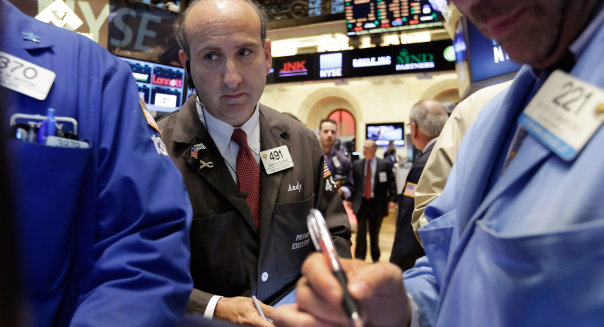
NEW YORK — U.S. stocks rebounded in afternoon trading Wednesday to end little changed as energy shares and Apple rebounded, offsetting continued concerns about a slowdown in China.
Investors picked up shares of energy companies, which have been hit hard by the China concerns along with other commodities in recent weeks, as oil prices bounced back. The S&P energy index rose 1.9 percent, the S&P 500’s biggest positive.
Apple (AAPL), for which China is a key market, also reversed course after falling more than 3 percent earlier to its lowest since January. It ended up 1.5 percent at $115.24 and was the biggest positive factor for all three major indexes.
Stocks had been down sharply early in the session after the yuan hit a four-year low, falling for a second day after Chinese authorities devalued the currency. The move has exacerbated worries about the outlook for China’s economy and its impact on the rest of the world.
The Dow moved nearly 300 points from its low of the day to its high before closing flat.
The S&P 500 briefly slipped into negative territory for the year during the session, and traded below its 200-day moving average, before bouncing back. The S&P 500 ended above that technical support level and up for the year so far.
“China is a huge wild card both in terms of the rate at which it’s slowing but also how the leadership is handling it,” said Bucky Hellwig, senior vice president at BB&T Wealth Management in Birmingham, Alabama.
“The reversal today is bullish … at least in the short term.”
Among sectors, financial shares declined the most, with the S&P financial index down 0.8 percent. China’s currency move has created more uncertainty over how soon the Federal Reserve may raise interest rates, analysts said.
The Dow Jones industrial average (^DJI) fell 0.33 points to 17,402.51, the Standard & Poor’s 500 index (^GSPC) gained 1.98 points, or 0.1 percent, to 2,086.05 and the Nasdaq composite (^IXIC) added 7.60 points, or 0.2 percent, to 5,044.39.
The CBOE Volatility index, a measure of the premium traders are willing to pay for protection against a drop in the S&P 500, also reversed course. It jumped as much as 18.7 percent to 16.28, its highest in a month, before ending down 0.7 percent.
Huge Implications
New York Federal Reserve President William Dudley said the yuan devaluation has huge implications for demand in the rest of the world and commodity prices, but it is too early to judge what is happening with Chinese currency policy.
Alibaba (BABA) was down 5.1 percent at $73.38 after hitting an all-time low of $71.03 after revenue growth slowed at China’s biggest e-commerce company. Yahoo (YHOO), which has a 15-percent stake in Alibaba, fell 4.3 percent to $34.49.
Macy’s (M) fell 5.1 percent to $64.11 after it also reported weak quarterly sales.
NYSE decliners outnumbered advancers 1,553 to 1,524, for a 1.02-to-1 ratio; on the Nasdaq, 1,564 issues fell and 1,229 advanced for a 1.27-to-1 ratio.
The S&P 500 posted 10 new 52-week highs and 19 lows; the Nasdaq recorded 30 new highs and 120 lows. About 8.2 billion shares changed hands on U.S. exchanges, above the 7.0 billion daily average so far this month, according to BATS Global Markets.
-.
What to watch Thursday:
At 8:30 a.m. Eastern time, the Commerce Department releases retail sales data for July, and the Labor Department releases import and export prices as well as weekly jobless claims.
At 10 a.m., the Commerce Department releases business inventories for June, and Freddie Mac releases weekly mortgage rates.
Earnings Season
These selected companies are scheduled to release quarterly financial results:
Advance Auto Parts (AAP)
Applied Materials (AMAT)
Coty (COTY)
King Digital Entertainment (KING)
Kohl’s (KSS)
Nordstrom (JWN)
Tribune Media (TRCO)
•Wall Street Rallies on Fed Rate Hike
•Fed Raises Interest Rates, Cites Ongoing US Economic Recovery
•US Aerospace Sector Poised for 2015 Record Trade Surplus: Group


Leave a Reply